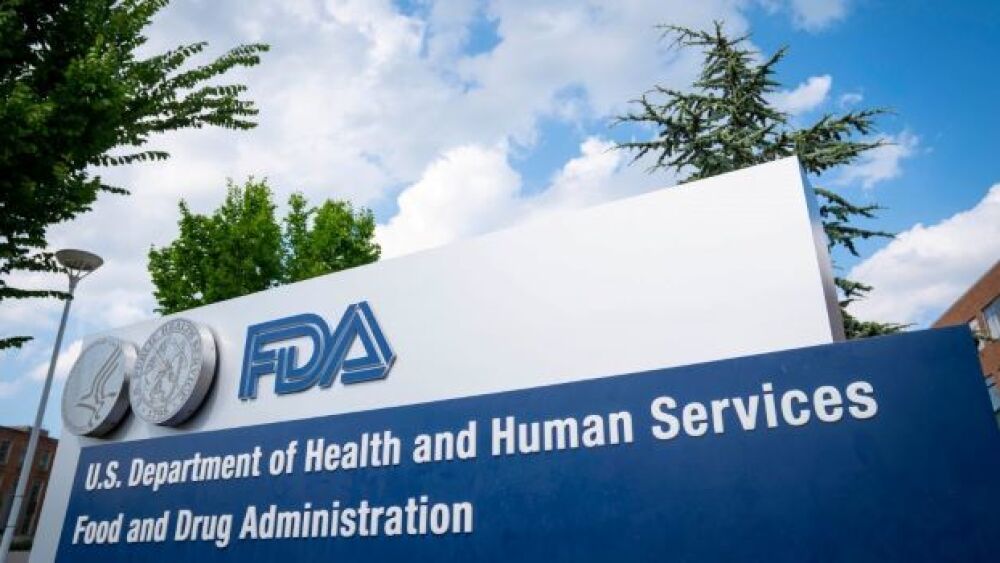The FDA’s Pulmonary-Allergy Drugs Advisory Committee voted against the potential Emergency Use Authorization of the company’s COVID-19 therapeutic candidate, sabizabulin.
Courtesy of Sarah Silbiger/Getty Images
The FDA’s Pulmonary-Allergy Drugs Advisory Committee voted against the potential Emergency Use Authorization of Veru’s COVID-19 therapeutic candidate, sabizabulin.
Late Wednesday, the committee voted 8-5 against the treatment aimed at hospitalized patients with moderate to severe infection who are at high risk for acute respiratory distress syndrome. The committee cited safety concerns and limited efficacy from a small study.
Following the negative review, investors began selling off company stock. As of Thursday morning in premarket trading, Veru’s share prices were down more than 63% to $5.51. The stock was sitting at $15.01 before trading was halted ahead of the advisory committee meeting.
This negative reaction raises the hurdle for Veru’s path to winning EUA for sabizabulin.
Committee members who voted against the question of whether or not the potential benefits of sabizabulin outweigh the risks in this patient population largely pointed to the limited availability of data that provides a satisfactory understanding of the risks and benefits. In a hearing following the vote, there were also concerns raised about sabizabulin being a new molecule with a mechanism of action that is not fully understood.
Dr. Daniel Gillen from the University of California at Irvine said with a limited efficacy and safety data set from the small study, there isn’t enough information to provide an answer about the risk-benefit profile. Gillen also said there is not a “full understanding of the mechanism of action” of sabizabulin, which gave him pause.
Likewise, Dr. Niten Seam, the associate chief and director of the Fellowship Critical Care Medicine Department at the National Institutes of Health, said he worries about the efficacy question. He suggested greater understanding would be available following a larger trial with a proper placebo group.
Other members of the panel who voted against the benefit-risk data largely sounded off similar concerns. Dr. Edwin Kim, an associate professor in the division of pediatric allergy and immunology at the University of North Carolina School of Medicine, suggested the benefit of protecting against mortality is important. In a hospital setting, Kim said the risks would be manageable.
While the PADAC voted against the risk-benefit profile of sabizabulin, the FDA could still grant the drug EUA. Mitchell Steiner, CEO of Veru, said the company will continue to work with the FDA in order to bring the drug to patients in a timely manner.
A Semi-Expected Outcome
Veru is seeking EUA based on positive Phase III data that showed sabizabulin, a novel dual antiviral and anti-inflammatory agent, generated a 55.2% reduction in deaths in moderate-to-severe hospitalized patients compared to placebo. COVID-19 infections treated in the study included the Delta and Omicron variants.
Ahead of the PADAC meeting, FDA researchers cast some doubts on the potential of sabizabulin.
On Monday, agency scientists released briefing documents that raised some red flags about the research into the COVID-19 therapeutic. The briefing documents pointed to issues with Veru’s identification of a clinically relevant patient population and raised concerns about the high placebo mortality rate.
Other uncertainties pointed out by the FDA included differences in hospitalization duration prior to trial enrollment; baseline imbalances in standard-of-care therapies; uncertain effects of goals of care decisions on all-cause mortality; among others.
At the time, the agency scientists said on their own, the issues do not invalidate the clinical data, but taken together, the instances raise red flags about the safety and efficacy of the drug candidate.





